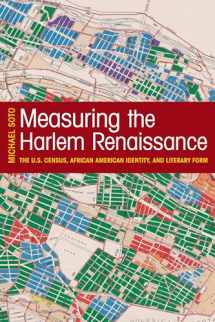
Measuring the Harlem Renaissance: The U.S. Census, African American Identity, and Literary Form
ISBN-13:
9781625342508
ISBN-10:
1625342500
Edition:
Illustrated
Author:
Michael Soto
Publication date:
2016
Publisher:
University of Massachusetts Press
Format:
Paperback
224 pages
FREE US shipping
Book details
ISBN-13:
9781625342508
ISBN-10:
1625342500
Edition:
Illustrated
Author:
Michael Soto
Publication date:
2016
Publisher:
University of Massachusetts Press
Format:
Paperback
224 pages
Summary
Measuring the Harlem Renaissance: The U.S. Census, African American Identity, and Literary Form (ISBN-13: 9781625342508 and ISBN-10: 1625342500), written by authors
Michael Soto, was published by University of Massachusetts Press in 2016.
With an overall rating of 3.8 stars, it's a notable title among other
books. You can easily purchase or rent Measuring the Harlem Renaissance: The U.S. Census, African American Identity, and Literary Form (Paperback) from BooksRun,
along with many other new and used
books
and textbooks.
And, if you're looking to sell your copy, our current buyback offer is $0.4.
Description
In this provocative study, Michael Soto examines African American cultural forms through the lens of census history to tell the story of how U.S. officialdom―in particular the Census Bureau―placed persons of African descent within a shifting taxonomy of racial difference, and how African American writers and intellectuals described a far more complex situation of interracial social contact and intra-racial diversity. What we now call African American identity and the literature that gives it voice emerged out of social, cultural, and intellectual forces that fused in Harlem roughly one century ago.Measuring the Harlem Renaissance sifts through a wide range of authors and ideas―from W. E. B. Du Bois, Rudolph Fisher, and Nella Larsen to Zora Neale Hurston, Langston Hughes, and Wallace Thurman, and from census history to the Great Migration―to provide a fresh take on late nineteenth―and twentieth―century literature and social thought. Soto reveals how Harlem came to be known as the "cultural capital of black America," and how these ideas left us with unforgettable fiction and poetry.


We would LOVE it if you could help us and other readers by reviewing the book
Book review

Congratulations! We have received your book review.
{user}
{createdAt}
by {truncated_author}


